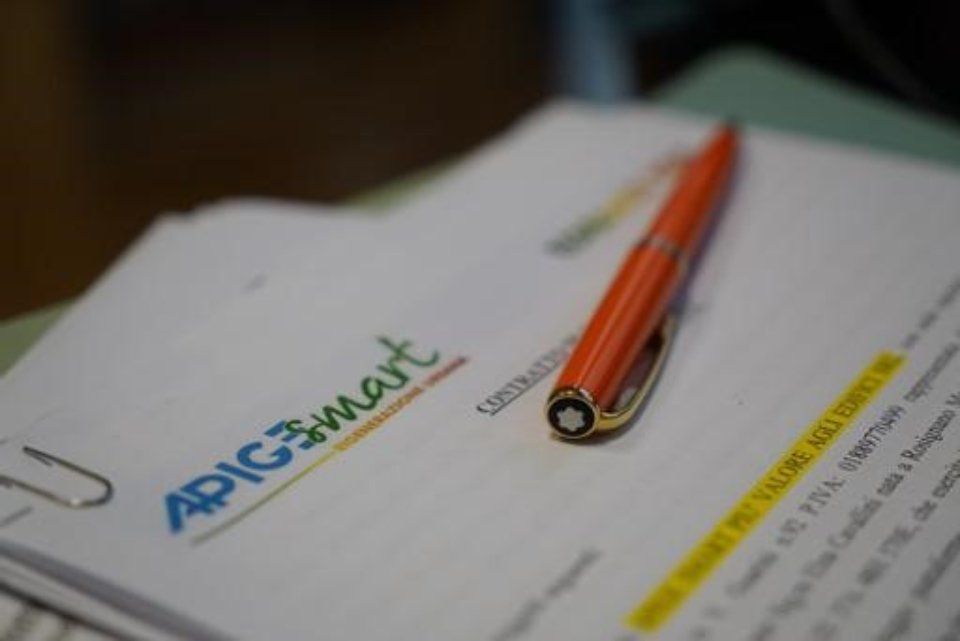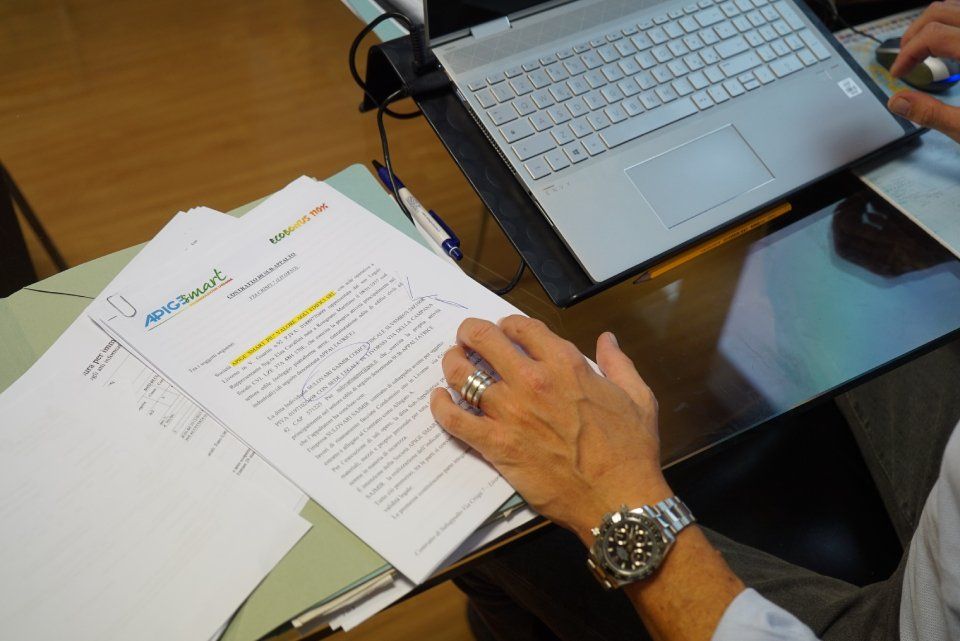
Slide title
Write your caption hereButton
Services
General contractor
-
Who can benefit from Apige Smart Pve services?
Apige Smart Pve is aimed at companies and customers interested in carrying out an energy or earthquake redevelopment on blocks of flats within the Superbonus 110% specifications.
Depending on the work that needs doing and the characteristics of the block of flats or the companies involved, Apige Smart Pve provides a range of business models and lets the customer choose the best one.
-
Taking care of your house pays off even more with Superbonus 110%
With the Superbonus and the option of an assignment or discount on your invoice when redeveloping a block of flats, it really becomes easier and more advantageous to live better.
The Superbonus, introduced in the ‘Relaunch’ Directorial Decree, provides for a 110% tax deduction for expenses incurred between 1 July 2020 and 30 June 2022 for ‘key’ work, namely:
- installation of insulation systems:
o insulation with thermal insulation systems
o insulation with nanotechnological thermal plaster
o insulation with sheets of inorganic fibre-reinforced agglomerate and natural mineral fibre;
- replacement of heating systems:
o condensation boiler
o hybrid boiler
o biomass boiler
o heat pump
- seismic improvement
The 110% deduction also extends to the following ‘key’ work, if carried out in conjunction with at least one of the operations mentioned above:
- solar power systems and storage systems integrated with them;
- charging infrastructures for electric vehicles
- solar thermal collectors
- home automation
- windows and frames
In some cases, where it is not possible to meet the minimum requirements to benefit from the 110% Superbonus, it may be possible to benefit from ‘standard’ incentives with lower rates (e.g. Ecobonus, Sismabonus, Ristrutturazione Edilizia, Facade Bonus, etc.) provided that the specific minimum requirements for obtaining the benefit are met, such as:
• Sustainable
Buildings that reduce consumption, waste and CO2 emissions.
• Affordable
Reduces both the cost of the operation and the bill.
• Valuable
Buildings that are worth more thanks to an energy class upgrade and improved safety and aesthetics.
-
Ecobonus 2021: 110% bonus for companies too?
How to do it.
Ecobonus 2021:
- Can companies benefit from the 110% deduction introduced by the Relaunch Decree? Let's see how and why.
- Case in point: blocks of flats.
- Characteristics of buildings, necessary documentation, notifying ENEA.
The 2021 Ecobonus is a series of tax deductions that allow Italian taxpayers to carry out works to improve the energy efficiency of a building, letting them deduct part (or all) of the expenses incurred in their tax return.
The important thing is that both the owner of the property and the tenant or user of the house can enjoy these tax benefits. With the introduction of the Superbonus, the 110% tax rate that allows work to be carried out free of charge, it has become even more convenient to carry out this type of renovation.
But there is one big piece of news: now, companies also have the chance to take advantage of the 110% deduction, as confirmed by the Italian Revenue Agency.
The deduction, which is valid for work carried out between 1 July 2020 and 31 December 2021, is therefore also valid for companies. Most importantly, it is not linked to the intended use of the property; therefore, buildings subject to energy efficiency work do not have to be instrumental assets to companies.
This is clearly stated in Resolution 34/2020 of the Italian Revenue Agency which, unlike before, opens up the Ecobonus to companies even for buildings that are not instrumental.
The government’s purpose was to highlight the public interest of energy saving.
Therefore, the property simply has to be at the disposal of the company, either as owner, through bare ownership or because it holds a right in rem of use, such as usufruct, use, dwelling or surface, renters or borrowers, provided they have the consent of the legal owner.
- Ecobonus 110% for companies: when?
- Ecobonus 2021: documentation
- Ecobonus 2021: FAQ
- Ecobonus 110%: three ways to take advantage of it
- 110% deduction: how?
- Characteristics
- Ecobonus 110%: types of work
- Expense ceilings for thermal insulation
- Expense ceilings for air conditioning systems in condominiums
- Expense ceilings for air conditioning systems in single-family buildings
- Key interventions: what are they?
- Obligation to notify ENEA
-
Ecobonus 110% for companies: when?
As now clarified by the Italian Revenue Agency, it must be specified exactly when companies and VAT number holders can take advantage of the 110% rate.
According to Article 119 of Decree Law 34/2020, an entrepreneur or self-employed person who carries out energy efficiency work only on premises and spaces used for commercial activities cannot claim the Ecobonus under any circumstances.
If, however, the building unit is located in a block of flats and the block undergoes upgrading work on its communal parts, then the financial benefit is also available to the owner of the commercial business or self-employment, i.e. the possibility of deducting the expenses incurred at the rate of 110%.
-
Ecobonus 2021: documents
To be eligible for this tax benefit, it is important to pay close attention to the necessary documents, which you must request from the company carrying out the work and then keep with care.
The method of payment to be used to take advantage of the deductions is by bank or postal transfer, with the following information:
- reason for payment, with reference to the regulation (Article 16-bis of Presidential Decree 917/1986)
- fiscal code of the recipient of the deduction
- fiscal code or VAT number of the beneficiary of the payment
- invoice number and date
-
Ecobonus 2021: FAQ
Doubts can often arise regarding tax breaks, as this is a series of works including masonry, garden renovation and buying furniture and large appliances.
Clarifying a few points remains essential:
- the tax deduction known as the Ecobonus is only granted for work carried out on existing homes and buildings, i.e. already registered in the land register or for which an application has already been lodged; in this case, it is important to keep the receipts for payment of municipal taxes such as ICI and IMU
- buildings that are under construction do not give you the right to claim tax relief
- the Ecobonus cannot be combined with the 50% renovation bonus also confirmed for the year 2021
-
Ecobonus 110%: three ways to use it
This shock proposal leaves three options to the Italian taxpayer carrying out home renovation listed under the Ecobonus:
- a deduction equal to 110% of the cost of the works at the time of the tax return
- transfer the tax deduction to the company that carried out the work, receiving a discount on the invoice equal to 100% of the costs incurred
- assignment of a tax credit corresponding to the deduction due, to other parties, including banks and other financial intermediaries, who are entitled to subsequent assignments
-
110% deduction: how?
For those who intend to take advantage of the 110% benefit, the deduction can be offset in 5 annual installments of the same amount (therefore no longer the classic 10). There are 2 alternatives:
1. Transfer of the tax deduction to the company carrying out the work, up to 100% of the cost. What does this mean? That the agreement on the percentage of transfer, i.e. 100%, has to be agreed with the company/dealer. So, you have to negotiate to find out how much the company will actually pay you.
2. Assignment to the bank or other financial intermediaries, who will in the meantime have gone through the steps to accept your credit purchase.
Features
Please note, however, that the government’s Decree Law stipulates that only works that upgrade the energy performance of a building by at least two energy classes or, if this is not possible, the highest energy class will benefit from the special 110% deduction, which can be demonstrated by means of an energy performance certificate (APE).
-
Ecobonus 110%: works included
There are three categories of so-called 'key' jobs that benefit from the 110% Superbonus, namely:
- insulation of opaque surfaces, described in technical terminology as vertical, horizontal and inclined opaque surfaces relating to the building’s skeleton, provided that they account for more than 25% of the gross dispersing surface area
- replacement of winter air conditioning systems in apartment buildings
- replacement of winter air-conditioning systems in single-family dwellings
Expense ceilings for insulation of opaque surfaces:
There are substantial changes to the classic Ecobonus when it comes to the expense ceilings introduced by the decree. They provide for a distinction based on the type of building and the type of work carried out.
So, to avoid misunderstandings, it is best to differentiate:
- €50,000 for single-family buildings or building units located inside multi-family buildings that are functionally independent and have one or more independent entrances from outside
- 40,000 multiplied by the number of building units making up the building, if composed of 2 to 8 building units
- 30,000 multiplied by the number of building units in the building if it has more than 8 units
Expense ceilings for air conditioning systems in condominiums
- €20,000 multiplied by the number of building units making up the building, for buildings with up to 8 units
- 15,000 multiplied by the number of units in the building, for buildings with more than 8 units
Expense ceilings for air conditioning systems in buildings
-
Key works: what are they?
The three types of works listed above are indicated as 'key'; carrying out of any of the three works allows taxpayers to deduct with a rate of 110% from other works that improve energy efficiency, provided they are carried out in the same time frame.
Therefore, other works that make the house more comfortable, with consequent energy savings, can be tackled without placing an excessive burden on the family budget.
Work which, if carried out in conjunction with key work, grants a right to the Superbonus:
- work on the skeleton of an existing building (e.g. replacement of window frames, windows, etc.)
- installation of infrastructure for recharging electric vehicles
- installation of solar panels for the production of hot water
- replacement of winter air conditioning systems with systems equipped with air or water condensing boilers
Obligation to notify ENEA
Companies are also required to notify ENEA within 90 days of the completion of works that improve energy performance.
If this is not done, the tax benefit is automatically lost in full, i.e. for both the current and following years.

Slide title
Write your caption hereButton
Slide title
Write your caption hereButton


























